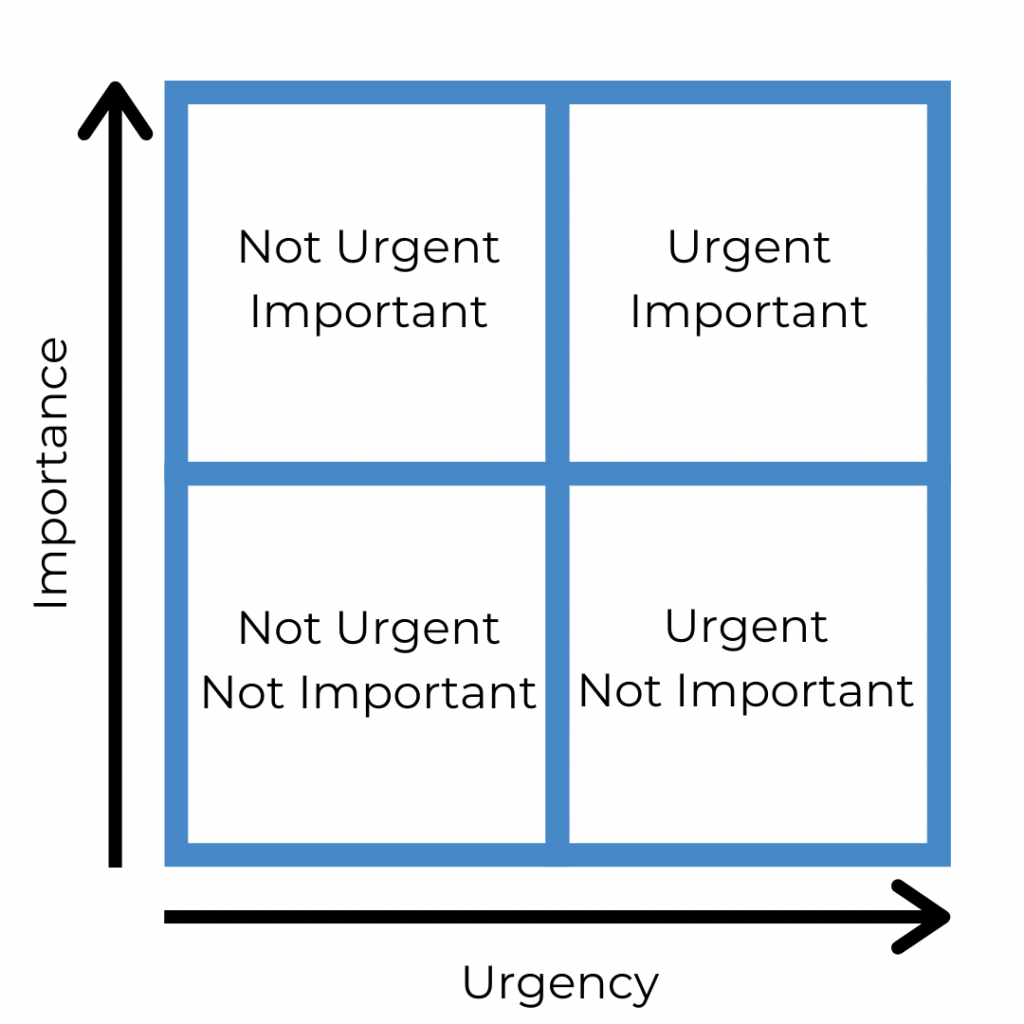I never have enough time to get things done!
Does it feel as though there aren’t enough hours in the day to get everything done? It doesn’t matter whether you’re a business owner, senior manager or office junior, we can all experience times when we feel as though we’re drowning in work.
The starting point to try and get on top of the situation is to look through your to do list and categorise the items on it. I find using the grid below can really help, start by dividing your page into four, with urgency on the x-axis and importance on the y-axis. Now go through your list and divide the things on it into four categories
- Important and Urgent – to be done first thing
- Important and Not Urgent – schedule in calendar
- Not Important and Urgent – delegate
- Not Important and Not Urgent – don’t do – in the bin

Items that are Important and Urgent need your immediate attention and focus. Don’t put off doing these as you’ll free yourself up to focus on the Important and Not Urgent items which is where your focus really needs to be, before they become urgent and put pressure on you. The Not Important and Urgent should be delegated and Not Important and Not Urgent items are things that can and should be assessed and either delegated or binned. I’m not saying that these things don’t need to be done, rather they don’t need to be done by YOU.
Now that you have taken control and can start to feel a little less pressured your attention needs to turn to the Important and Not Urgent tasks on your list. This is where you will find it useful to set up a default diary. Using a system allows you to block out times during your week to focus on particular tasks. They might be recurring activities, so doing your admin every Monday morning for example, reviewing the marketing activity for the business on a Friday afternoon, the weekly Wednesday team meeting, setting aside one hour each day to focus on the new project that has been stalling because you’ve been busy dealing with other things.
Don’t forget to include some time out during your day even if it’s only making sure that you take a lunch break. Taking regular breaks throughout the day will help with your productivity and also enable you to better focus on the tasks you need to accomplish. Your diary should be full, including the time out for breaks
If something slips due to the unexpected, which there will always be, then copy the entry to another day, so that it doesn’t get missed.
Once you have spent time setting up your diary, then stick to it.
To help keep you on track I thought I’d share my top time management with you:
- Set personally motivating goals
- Time phone, email & other interruptions
- Don’t finish today until you plan tomorrow
- “Eat a frog” for breakfast every day*
- Don’t major in minor things
- Create a default diary driven by your 90-day goals
- Agendas for all meetings
- Conference calls to save time
- Learn to delegate to your team – or wear different hats if you do everything i.e. one for admin, one for marketing, etc.
- Identify and eliminate the stuff you shouldn’t be doing
- Have a business coach to keep you on track!
Setting up and using your default diary means that you will start to work in a proactive rather than reactive way. Your focus will shift away from just jumping in and doing the next thing on your list, or dealing with the problem that your colleague brings you, to dealing with the things that you’ve been putting off. Think about how good that will feel. You’ll also be working on the important stuff, rather than simply the urgent stuff. In other words, you’ll be “eating your frogs”!
When working out your default diary it’s a good idea to include tasks that you have to do regularly, that could be ordering more stationary or finalising the payroll for example. Also include reminders to follow up with contacts you’ve made networking, check-in with key customers, even team members. You can create your default diary in Google Calendar, Outlook or even a paper diary – it really doesn’t matter so long as you do it and then stick to it.
Don’t be put off if you get to the end of your first week using the default diary system and find you’ve over estimated what you’re able to get done. This is bound to happen, however with time and practice you’ll soon be more accurate and realise the benefits of using this system.
*Further reading: “Eat That Frog” by Brian Tracy
Originally posted 2021-02-24 13:00:09.
- Why should you have written processes in your business? - January 15, 2026
- How do I put together an exit strategy for my business? - December 11, 2025
- I never have enough time to get things done! - August 30, 2025






